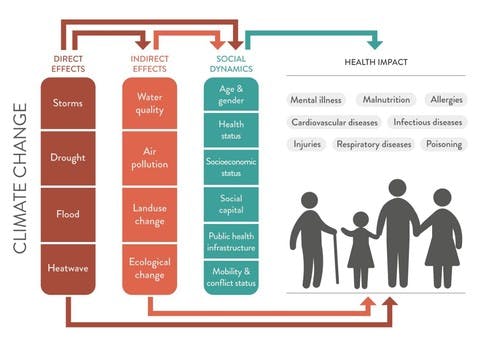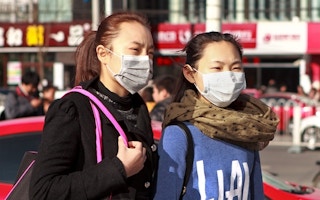The threat that climate change poses to human health is so great that it could undermine the last half-century of gains in development and global health, says an international commission of medical experts.
One author, fiercely critical of international efforts to confront the problem, says it is a medical emergency that demands an emergency response.
More hopefully, though, the group’s report says that international efforts to tackle climate change – “the defining challenge of our generation” – represent one of the greatest opportunities to improve health worldwide this century.
The report, published in The Lancet medical journal, is the work of the 2015 Lancet Commission on Health and Climate Change.
Unparalleled chance
It says many responses to climate change have direct and indirect health benefits – from reducing air pollution to improving diet – and so efforts to reduce the threat offer an unparalleled chance for far-reaching gains in health.

Image: The Lancet Commission on Health and Climate Change
But the commission is under no illusions about what is at stake. The authors say the potentially catastrophic risk to human health posed by climate change has been underestimated
They add – in a familiar refrain – that while the technologies and finance required to address the problem do exist, the global political will to implement them is lacking.
Professor Hugh Montgomery, one of the commission’s co-chairs and director of the University College London (UCL) Institute for Human Health and Performance, UK, says: “Climate change is a medical emergency. It thus demands an emergency response, using the technologies available right now.
“Under such circumstances, no doctor would consider a series of annual case discussions and aspirations adequate, yet this is exactly how the global response to climate change is proceeding.”
Professor Anthony Costello, another of the commission’s co-chairs and director of the UCL Institute for Global Health, says: “Climate change has the potential to reverse the health gains from economic development that have been made in recent decades – not just through the direct effects on health from a changing and more unstable climate, but through indirect means such as increased migration and reduced social stability.”
The report says the direct health impacts of climate change come from the increasing frequency and intensity of extreme weather events, especially heatwaves, floods, droughts and storms. Indirect impacts result from changes in infectious disease patterns, air pollution, food insecurity and malnutrition, involuntary migration, displacement and conflicts.
It says there are many ways in which action on climate change brings immediate health gains. For example, burning fewer fossil fuels reduces respiratory diseases, and what doctors call “active transport” (walking and cycling) cuts pollution and traffic accidents, and reduces rates of obesity, diabetes, coronary heart disease and stroke. There are also health benefits from changes to diet, such as eating less red meat.
Entrenched interests
The commission is an extensive collaboration between experts from Europe and China. Its other co-chair, Professor Peng Gong, from Tsinghua University, Beijing, says: “The health community has responded to many grave threats to health in the past.
“It took on entrenched interests such as the tobacco industry, and led the fight against HIV/AIDS. Now is the time for us to lead the way in responding to another great threat to the human and environmental health of our generation.”
The report provides a set of recommendations for policy-makers, and the authors propose the formation of a new global independent body on climate change and health − to be called Countdown to 2030: Climate Change and Health Action − to monitor and report every two years on the health impacts of climate change.

















